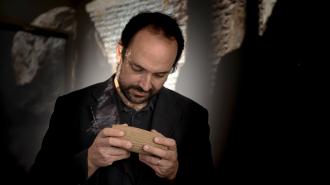German researchers are developing an algorithm to help decode ancient cuneiform tablets — including those containing the oldest known work of world literature.
Ancient poem: The Epic of Gilgamesh is a Babylonian poem first written in cuneiform characters on clay tablets around 4,000 years ago. It tells the story of Gilgamesh, the king of the city of Uruk, and his quest for immortality.
Over the centuries, the poem was copied onto countless other tablets in both the original Sumerian language as well as Akkadian.
Only a few tablets from the original version of the poem have survived to modern day, so experts have had to try to piece it together by transcribing onto paper what they’ve found chiseled into various tablet fragments and comparing those with others’ transcriptions.
“Cuneiform script is ambiguous: There are up to 25 ways to represent the same syllable.”
Enrique Jiménez
The challenge: This approach has led to about 60% of the poem being translated into readable form, but it’s incredibly painstaking, given the multiple languages, the physical disbursement of the fragments and transcriptions, and the challenges inherent in cuneiform script.
“[C]uneiform script is ambiguous: There are up to 25 ways to represent the same syllable,” said Enrique Jiménez, a professor of Ancient Near Eastern literatures at Ludwig Maximilian University of Munich. “Consequently, each word can also be written in many different ways.”
As a result, many fragments of cuneiform have yet to be placed into a larger context.
“When the algorithm is ready, it should be able to … find fragments that could belong together.”
Enrique Jiménez
The AI: In 2018, a team led by Jiménez began working to put photos and available transcriptions of all known cuneiform tablets online. Today, their collection, the “Fragmentarium,” includes more than 300,000 lines of text taken from more than 21,000 tablets.
In addition to making it easier for researchers everywhere to access all of these cuneiform texts, Jiménez’s team is also training a machine learning algorithm, cuneiBLAST, that uses pattern recognition to identify fragments that might be identical or from the same work.
“When the algorithm is ready, it should be able to compare individual text sequences with the database and find fragments that could belong together,” said Jiménez in 2019.
“The new texts we’re discovering are helping us understand the literature and culture of Babylon as a whole.”
Enrique Jiménez
The impact: There’s no word on when Jiménez expects cuneiBLAST to be fully trained, but the AI has already helped identify several fragments as belonging to the Epic of Gilgamesh, including one belonging to a 130 BC version of the poem — the most recent one discovered.
CuneiBLAST has also identified connections between fragments of many other works written on cuneiform tablets.
“There’s so much work to do in the study of Babylonian literature,” said Jiménez. “The new texts we’re discovering are helping us understand the literature and culture of Babylon as a whole.”
Looking ahead: Approximately 200 scholars have accessed the Fragmentarium upon request since its inception. In February 2023, Jiménez made it available to the public, along with the most up-to-date digital version of the Epic of Gilgamesh.
“Everybody will be able to play around with the Fragmentarium,” said Jiménez. “There are thousands of fragments that have not yet been identified.”
We’d love to hear from you! If you have a comment about this article or if you have a tip for a future Freethink story, please email us at tips@freethink.com.
